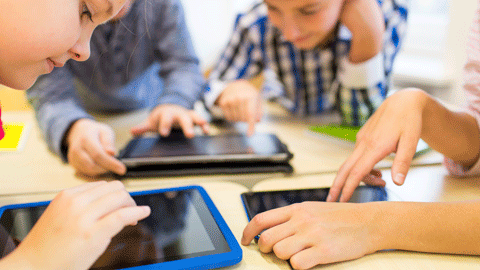Study on use of digital technologies by children under 8

17/02/2016
According to the study, tablets and television are two of the devices that children of this age prefer. They use them mainly for entertainment: playing, watching videos and cartoons and, less frequently, reading e-books. Although some schools are already using digital devices, the children are not expected to use them at home for school work or other educational tasks.
The study shows that the children are autonomous in their use of tablets and television, though under rules set by adults, while computers and mobile phones are used much less and under supervision. Very few children have a working phone at these ages, though they are allowed to use phones with no SIM card or wi-fi, and they do not engage with social networks either.
According to the researchers the adults believe that the children learn to use digital devices on their own, by observing their parents and other family members (especially cousins). However, they do need help to configure devices and the parents control what is installed on them. The researchers believe it important to study further the way in which children learn to use devices and the roles played by observation of others, play with others and mediation by others.
Among the benefits that the report highlights is the fact that parents perceive early access to technology as a process of familiarisation and preparation for the future, as these devices are bound to form part of their children's lives (at school, in the community and at work). As for the risks, the report points out that young children can be exposed to inappropriate content (such as sex, violence or explicit language) while online, though it makes it clear that none of the families has had any particularly negative experiences, and that some families do not find parental filters effective.
The researchers recommend encouraging children to self-regulate their use of technologies. While conceding that more research is needed on this issue, they argue that since children mainly use technology for play purposes, parental supervision and regulation could be seen as an intrusion on an activity that is traditionally autonomous in nature. They also recommend seeking alternative strategies to that of restricting online connectivity when using digital devices, as this takes away their very essence and prevents children from gaining experience in online exploration. A third recommendation is to foster digital experiences that involve the whole family, with the idea of limiting (but not excluding) individual use.
This research is based on a previous qualitative pilot study involving 70 families from 6 European countries and set a research Methodology that revolved around interviews with children and parents.
The Spanish component of the project "Young Children (0-8) and digital technology" is coordinated by Cristina Aliagas (Universitat Autònoma de Barcelona) and David Poveda and the coordinator for the whole of Europe is Stephane Chaudron. The European project, coordinated by the European Commission, the Joint Research Centre, and the Institute for the Protection and Security of the Citizen, within the framework of the institutional project ECIT (Empowering Citizen’s Rights in Emerging ICT), has been conducted simultaneously in 19 countries (Belgium, Bulgaria, Croatia, Cyprus, Czech Republic, Denmark, Finland, Germany, Italy, Latvia, Malta, Norway, Portugal, Romania, Russia, Slovenia, Spain, The Netherlands, United Kingdom) by 37 participating institutions, since 2014.
Complete text of the national report:
https://ddd.uab.cat/record/145656